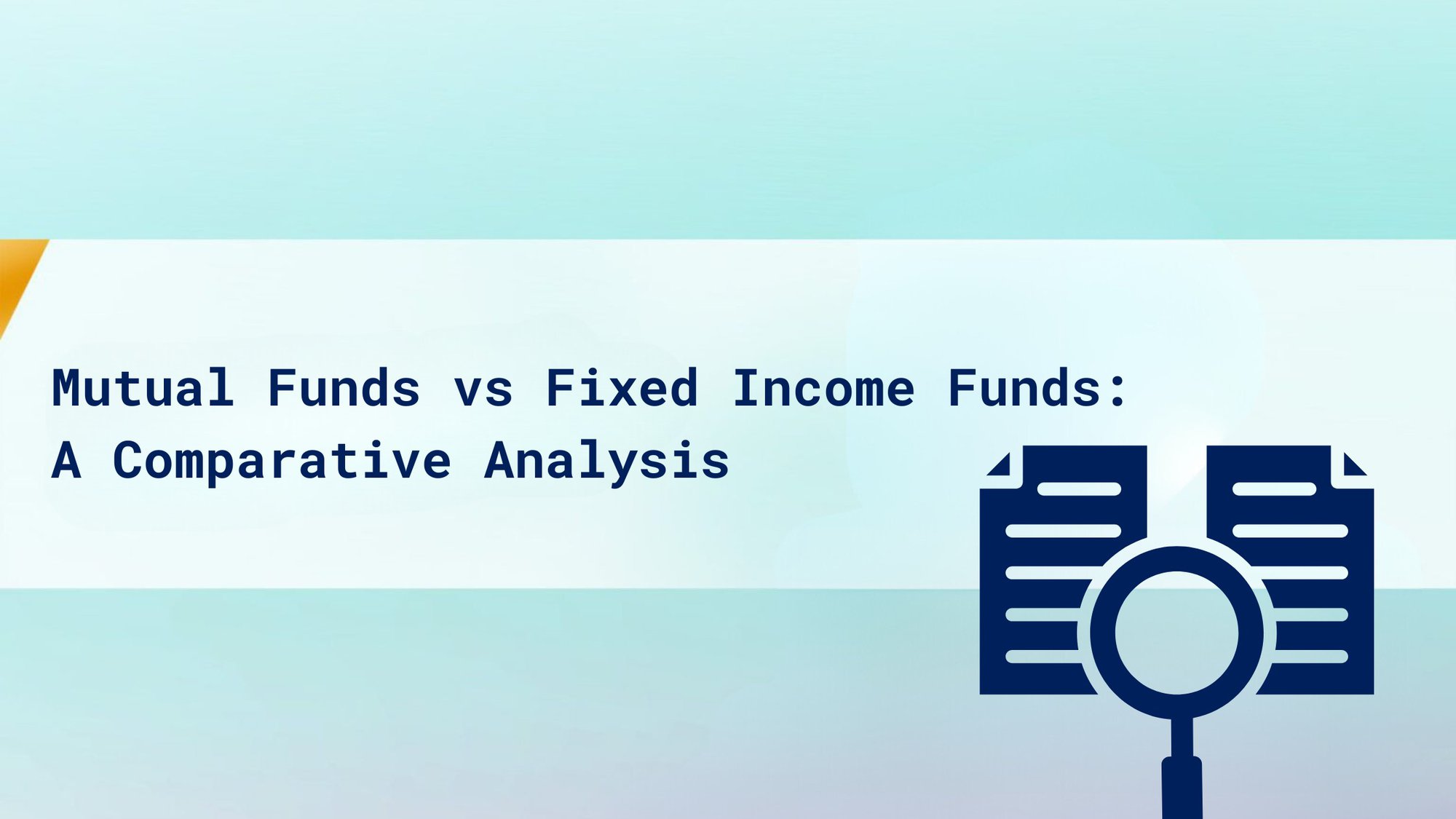
Mutual Funds vs Fixed Income Funds: A Comparative Analysis
Author Taiwo Temitope-Adesope
Mutual funds and fixed-income funds are two popular investment options in Nigeria. Both types of funds offer investors the opportunity to invest in a diversified portfolio of assets managed by professionals. Mutual funds invest in a variety of assets, including stocks, bonds, and money market instruments. Fixed-income funds, on the other hand, invest primarily in fixed-income securities such as bonds and treasury bills.
Investors in Nigeria have a wide range of mutual funds and fixed-income funds to choose from. According to a report by Nairametrics, as of July 2023, the mutual fund market in Nigeria was valued at N1.87 trillion. The report also highlights that equity-focused mutual funds have demonstrated superior performance compared to fixed-income-based funds.
When comparing mutual funds vs fixed income funds, investors should consider their investment goals, risk tolerance, and time horizon. Mutual funds may be suitable for investors looking for long-term growth and are willing to take on more risk, while fixed-income funds may be more appropriate for investors seeking a steady stream of income with lower risk. Understanding the differences between these two types of funds can help investors make informed decisions about their investment portfolios.
Understanding Mutual Funds vs Fixed Income Funds
Definition of Mutual Funds
A mutual fund is a type of investment vehicle that pools money from various investors to buy a diverse range of securities such as stocks, bonds, and money market instruments. A professional fund manager manages the fund. He/she invests the pooled money in various assets to generate returns for the investors. The returns are distributed among the investors in proportion to their investment in the fund.
The Securities and Exchange Commission (SEC) regulates mutual funds offered by various asset management companies. Some of the popular types of mutual funds in Nigeria include equity funds, fixed-income funds, money market funds, and balanced funds. The net asset value (NAV) of a mutual fund is calculated by dividing the total value of the fund's assets by the number of outstanding shares.
Definition of Fixed Income Funds
Fixed-income funds are a type of mutual fund that invests in fixed-income securities such as bonds, treasury bills, and other debt instruments. These funds generate regular income for the investors in the form of interest payments. Investors generally consider Fixed income funds to be less risky than equity funds as they provide a fixed rate of return and are less volatile.
In Nigeria, the Securities and Exchange Commission (SEC) regulates the fixed-income funds that asset management companies offer. These funds are ideal for investors who are looking for a regular source of income and are willing to accept a lower rate of return in exchange for lower risk.
In summary, mutual funds and fixed-income funds are both types of investment vehicles that allow investors to pool their money and invest in a diversified portfolio of assets. While mutual funds invest in a range of assets such as stocks, bonds, and money market instruments, fixed-income funds focus on fixed-income securities such as bonds and treasury bills. Investors in Nigeria can choose from a variety of mutual funds and fixed-income funds offered by various asset management companies.
Comparative Analysis: Mutual Funds vs Fixed Income Funds
Risk and Return Profiles
When comparing mutual funds and fixed-income funds in Nigeria, it is important to consider their risk and return profiles. Mutual funds tend to offer higher potential returns than fixed-income funds but also come with higher risks. This is because mutual funds invest in a diverse portfolio of assets, including equities, bonds, and money market instruments, which can be subject to market volatility. On the other hand, fixed-income funds primarily invest in bonds, which offer a fixed rate of return. Investors also consider them less risky than equities.
Investment Strategies
Another key difference between mutual funds and fixed-income funds is their investment strategies. A team of fund managers manage mutual funds and make investment decisions based on market trends and other factors. Fixed-income funds, on the other hand, are often passively managed, with investments made according to a predetermined strategy.
Regulatory and Operational Aspects
The Securities and Exchange Commission (SEC), regulates both mutual funds and fixed-income funds in Nigeria. However, there are some differences in the regulatory and operational aspects of these two types of funds. For example, mutual funds must provide investors with a prospectus that outlines the fund's investment objectives, risks, and fees. Fixed-income funds, on the other hand, may not be required to provide such detailed information.
In terms of operational aspects, mutual funds are typically structured as collective investment schemes, with investors pooling their money together to invest in a diversified portfolio of assets. Fixed-income funds, on the other hand, may be structured as individual securities, with investors purchasing shares in a specific bond or other fixed-income instrument.
Overall, both mutual funds and fixed-income funds can be effective investment vehicles for Nigerian investors, depending on their individual investment goals and risk tolerance. It is important for investors to carefully consider and compare the risks and potential returns of each type of fund before making an investment decision. nairaCompare can help with this!
Choosing the Best for You?
nairaCompare has a wide range of investment options you can compare and choose from.
With nairaCompare, you can effortlessly:
- Compare investments from different platforms in Nigeria in one place.
- Filter and sort offer based on your investment amount and risk appetite.
- Apply for your chosen investment option directly through nairaCompare, saving you time and hassle.
Skip the site hopping! Compare on nairaCompare today!

Market Trends and Investor Considerations
Recent Performance in Nigeria
Nigeria's mutual fund industry has experienced steady growth over the years, with assets under management (AUM) reaching ₦1.6 trillion as of October 2021, according to Nairametrics. Inflation rates have been a major concern for investors, with inflation reaching 15.75% in December 2021. This has led to a shift in investment decisions, with many investors opting for fixed-income funds as a way to hedge against inflation.
The Nigerian Stock Exchange (NSE) has also experienced volatility due to the impact of inflation and other market factors. As a result, many investors have been cautious about investing in stocks. However, some mutual funds have been able to outperform the market, providing investors with a regular income stream.
Investor Profiles and Fund Selection
Investors in Nigeria have different risk appetites and investment goals. Retail investors, for instance, are more likely to invest in mutual funds, especially fixed-income funds, as a way to earn a regular income. On the other hand, institutional investors such as pension funds and investment trusts tend to invest in a mix of stocks and fixed-income funds to diversify their portfolios.
When selecting a mutual fund, investors should consider the fund's investment objective, past performance, and fees. They should also assess the fund's risk profile and ensure that it aligns with their investment goals and risk appetite.
In conclusion, investors in Nigeria have different investment goals and risk appetites. Recent market trends such as inflation have led to a shift in investment decisions, with many investors opting for fixed-income funds. When selecting a mutual fund, investors should consider the fund's investment objective, past performance, and fees.
Conclusion
In conclusion, both mutual funds and fixed-income funds have their advantages and disadvantages. Mutual funds, especially equity-focused ones, have demonstrated superior performance compared to fixed-income-based funds within Nigeria's thriving mutual funds industry, valued at N1.87 trillion. On the other hand, fixed-income funds offer a more stable and predictable return, which is attractive to more risk-averse investors.
Investors in Nigeria should consider their investment goals, risk tolerance, and investment horizon when choosing between mutual funds and fixed-income funds. They should also carefully evaluate the fund manager's track record, investment strategy, and fees before investing in any fund.
Overall, mutual funds and fixed-income funds are both viable investment options for Nigerian investors. It is essential to diversify one's portfolio across different asset classes to mitigate risk and maximize returns.
It is crucial to note that investing always involves risk, and past performance is not a guarantee of future results. Therefore, investors should seek professional financial advice before making any investment decisions.
About Author

Taiwo Temitope-Adesope
Taiwo is a passionate storyteller and strategist dedicated to empowering women and crafting compelling narratives. A First-Class graduate in Mass Communication from Covenant University, she specializes in writing, public relations, and digital marketing. As a Content Manager at Suretree, she drove a 50% increase in web traffic through SEO and boosted website engagement by 60% in just four months. Her leadership experience includes serving as Public Relations Officer for the Covenant University Student Council and contributing to impactful volunteer initiatives. With expertise in strategic thinking and business acumen, Taiwo continues to create stories that inspire confidence and imagination.
.png?width=1615&height=444&name=nairaCompare%20Christmas%20logo%20(PNG).png)




.jpg?width=352&name=What%20is%20a%20balanced%20fund%202%20(3).jpg)



